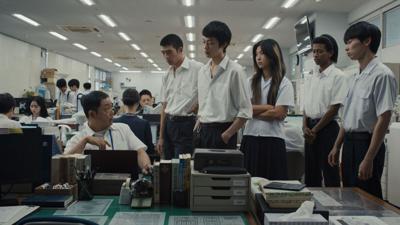Japan is the official hot destination for travel post-pandemic. Almost everyone knows someone who is planning a vacation there, or just came back from one. But hidden under the surface, the imperial heart of Japan still beats through the scars of a colonial past.
Happyend follows a group of Japanese high schoolers in the near future who, after pranking the principal, are faced with the implementation of a security system that monitors them on a behavioral point-based system. The event causes a rift in a student friend group when Kou (Yukito Hidaka) is fed up with the discrimination he receives as a Zainichi Korean, and Yuta (Hayato Kurihara) just wants to focus on music.
“The main event that I was responding to for Happyend was what actually happened in 1923,” director Neo Sora tells the Scene. “The Great Kantō Earthquake essentially was the biggest earthquake to strike the Tokyo region in the past 100 years [and] resulted in tens of thousands of deaths, but the often-neglected portion of that is that the quake also triggered a massacre and genocide of Zainichi Koreans by the hands of common Japanese civilians. The imperial government at the time used that opportunity to weed out anarchists and leftist dissidents and also the Korean independence movement. … I didn’t experience that, of course, and I did experience the Abe era and also the Bush era, now the Trump era. Those are the kind of cultural touchstones and images seared into my brain. I think for me, the biggest was 3/11 [the 2011 tsunami], but also, of course, 9/11 was a really big influence, especially because I was here in New York when that happened.”
“I’m kind of folding in all these different kinds of references and times within one story,” he says. “But at the same time, it’s an evergreen pattern.”
In Sora’s dystopian future, music is all AI-curated, and AI powers the machines that are used to control the students. This kind of technology clashes heavily with Sora’s artistic and musical background as the son of composer Ryuichi Sakamoto.
“Art and music [is] especially so fundamentally tied to the body and physicality,” says Sora. “The truth is that AI just doesn’t have that. You can copy what one’s body is, but it is just a copy, even though it might be really faithful to something that actually exists. And so what’s really important is actually these bodies in space. … [My first film, 2023’s Ryuichi Sakamoto: Opus] was also very much about the physicality — that was really all the whole film was about.”
Politics can drive a wedge not only between friends, but sometimes within ourselves. Yuta and Kou often seem to embody the struggle that many people feel internally — between political activism and their own happiness.
“It’s a daily swinging in between these two poles [of] complete surrender to this inevitable kind of moving toward this apocalyptic world, and trying to hold dear what is important to you while it lasts,” says Sora. “Actually, Walter Benjamin called it like a messianic hope that something new can happen. … That is definitely a reflection of the daily swing that I experienced between both poles. One day I wake up and I completely feel like Kou, and then later that day, I’m totally Yuta. This is so exhausting and tiring, right?”
“I once had a session with the screenwriter Joan Tewkesbury, who worked a lot with Robert Altman,” he says. “She was saying every story, every character comes from within your body, and in that way I think I really wrote myself into all these characters as well.”





